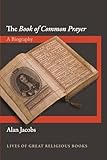 I’m not an Episcopalian, or even particularly religious, so it’s a bit of a surprise to me that one of the books I most enjoyed this year was Alan Jacobs’s The Book of Common Prayer: A Biography (Princeton University Press, 2013). It turns out that the story of the Anglican prayer book is a great yarn: a tale of theological dispute and refined prose style against a backdrop of the mafia-like power struggles of England’s royal families. Jacobs is a tactful historian, who doesn’t assume that his readers know much about English history or religious doctrine. But I imagine that even a reader who knew a great deal would enjoy the snap of Jacobs’s telling, as when he describes an early disavowal of transubstantiation as “palpably crabby.” If you’ve ever wondered why the Church of England has failed to substantially revise its prayer book since 1662, or what the jokes in Victorian novels about church candlesticks are really about, this is the history for you.
I’m not an Episcopalian, or even particularly religious, so it’s a bit of a surprise to me that one of the books I most enjoyed this year was Alan Jacobs’s The Book of Common Prayer: A Biography (Princeton University Press, 2013). It turns out that the story of the Anglican prayer book is a great yarn: a tale of theological dispute and refined prose style against a backdrop of the mafia-like power struggles of England’s royal families. Jacobs is a tactful historian, who doesn’t assume that his readers know much about English history or religious doctrine. But I imagine that even a reader who knew a great deal would enjoy the snap of Jacobs’s telling, as when he describes an early disavowal of transubstantiation as “palpably crabby.” If you’ve ever wondered why the Church of England has failed to substantially revise its prayer book since 1662, or what the jokes in Victorian novels about church candlesticks are really about, this is the history for you.
 It was a Victorian novel that gave me the most pleasure this year. In The Last Chronicle of Barset, I came to the end of Anthony Trollope’s Barchester novels. A clergyman is accused of embezzling a check. An archdeacon indignantly refuses to bless his son’s marriage to a young woman from poor and disgraced family. A woman jilted by one lover refuses to let herself be won over by another. A jumble of plots, really. But Trollope writes so genially and with such a light irony that one has the impression that one could happily read a story by him about almost anything. Trollope’s world doesn’t take itself too seriously. “All that is over now, you know,” sighs a young woman who is aware that she was born too late to get a Byronic lover. “Young people take houses in Woburn Place, instead of being locked up, or drowned, or married to a hideous monster behind a veil.” But emotions are still intense in his world, even if less grandiosely rendered. When the anger of the indignant father begins to lose out to his love, for example, the father betrays it by writing to a neighbor about the trapping of foxes, which the son likes to hunt, and which the son won’t ever be able to afford to hunt again if the father persists in his anger. It’s so muddled and human a way to come to a realization of one’s feelings that, as a novelistic achievement, it’s perfect.
It was a Victorian novel that gave me the most pleasure this year. In The Last Chronicle of Barset, I came to the end of Anthony Trollope’s Barchester novels. A clergyman is accused of embezzling a check. An archdeacon indignantly refuses to bless his son’s marriage to a young woman from poor and disgraced family. A woman jilted by one lover refuses to let herself be won over by another. A jumble of plots, really. But Trollope writes so genially and with such a light irony that one has the impression that one could happily read a story by him about almost anything. Trollope’s world doesn’t take itself too seriously. “All that is over now, you know,” sighs a young woman who is aware that she was born too late to get a Byronic lover. “Young people take houses in Woburn Place, instead of being locked up, or drowned, or married to a hideous monster behind a veil.” But emotions are still intense in his world, even if less grandiosely rendered. When the anger of the indignant father begins to lose out to his love, for example, the father betrays it by writing to a neighbor about the trapping of foxes, which the son likes to hunt, and which the son won’t ever be able to afford to hunt again if the father persists in his anger. It’s so muddled and human a way to come to a realization of one’s feelings that, as a novelistic achievement, it’s perfect.
More from A Year in Reading 2013
Don’t miss: A Year in Reading 2012, 2011, 2010, 2009, 2008, 2007, 2006, 2005
The good stuff: The Millions’ Notable articles
The motherlode: The Millions’ Books and Reviews
Like what you see? Learn about 5 insanely easy ways to Support The Millions, and follow The Millions on Twitter, Facebook, Tumblr.










